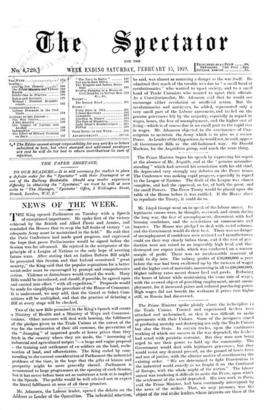Mr. Lloyd George went on to speak of the labour
unrest. Its legitimate causes were, he thought, ovenvork and strain during the long war, the fear of unemployment, discontent with bad housing conditions, and the restrictions on amusements and luxuries. The House was pledged to deal with social reform+, and the Government would do their best. There was no danger of unemployment if confidence were restored and manufacturers could see their way clearly before them, and if the cost of pro- duction were not raised to an impossibly high level told the+ destroyed our export trade, which was conducted on a narrow margin of profit. There was no inexhaustible reservoir of profit to dip into. The railway profits of 00,000,000 a year before the war had been swallowed up by the increase of wages and the higher cost of materials, amounting in all to £90,000,000. Higher railway rates meant dearer food and goods. Reducing the hours of labour while maintaining the same rate of wage s, with the avowed object of providing entployment, meant unem- ployment. for it increased prices and reduced purchasing-power. High wages did not benefit the workman if prices rose highs still, as Russia had discovered.


































